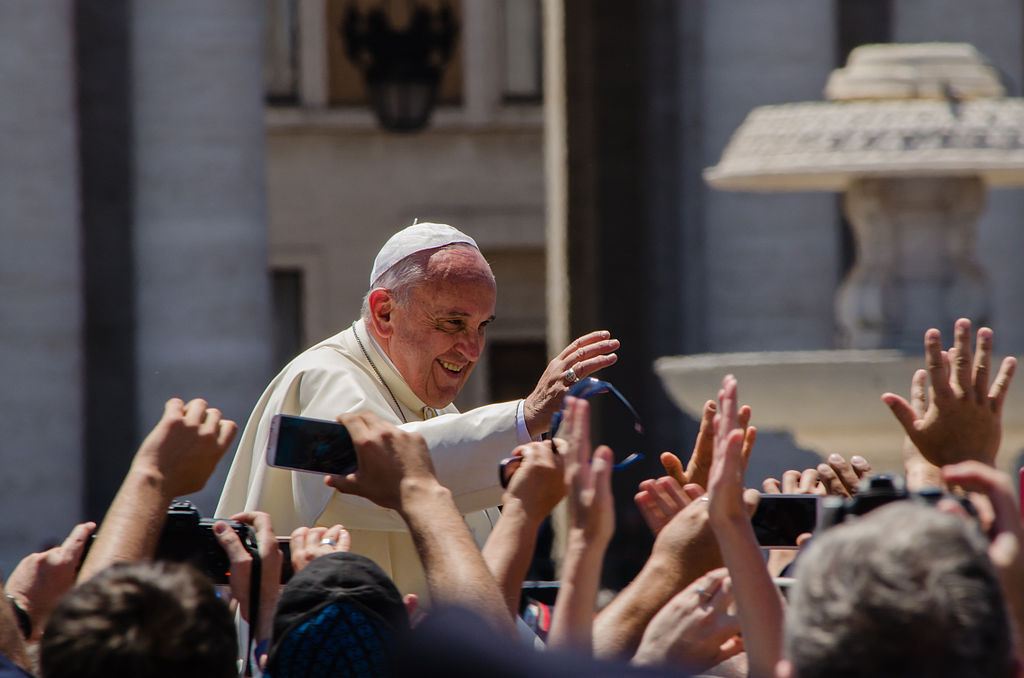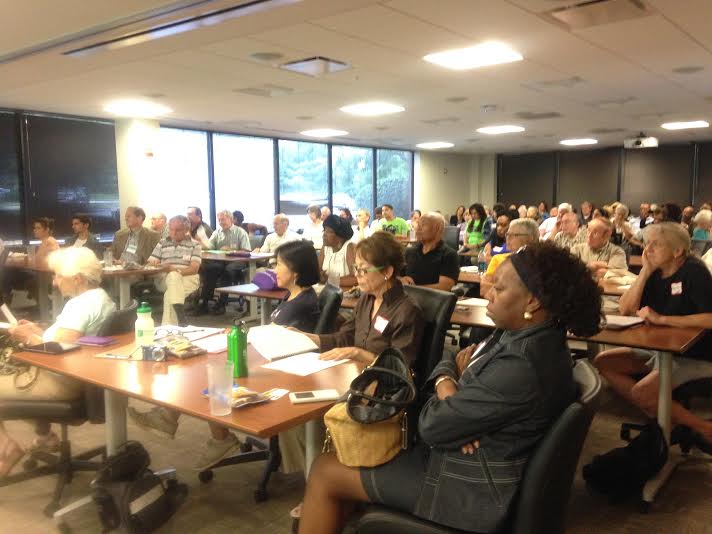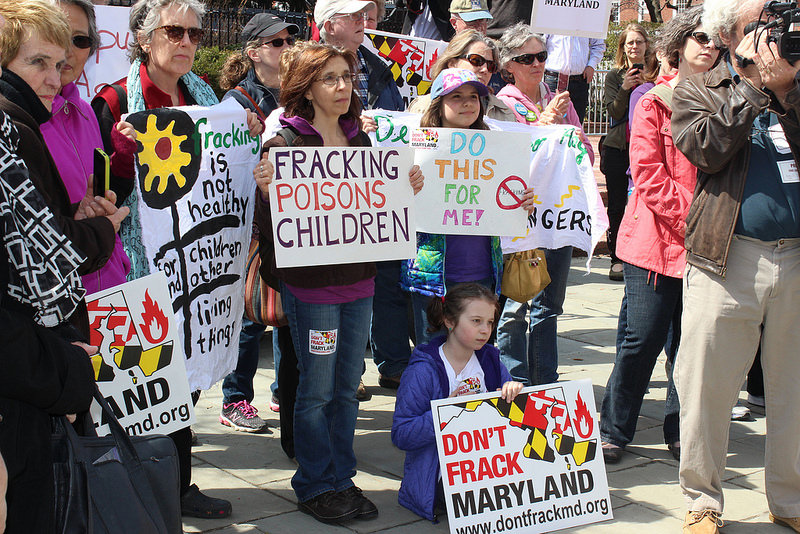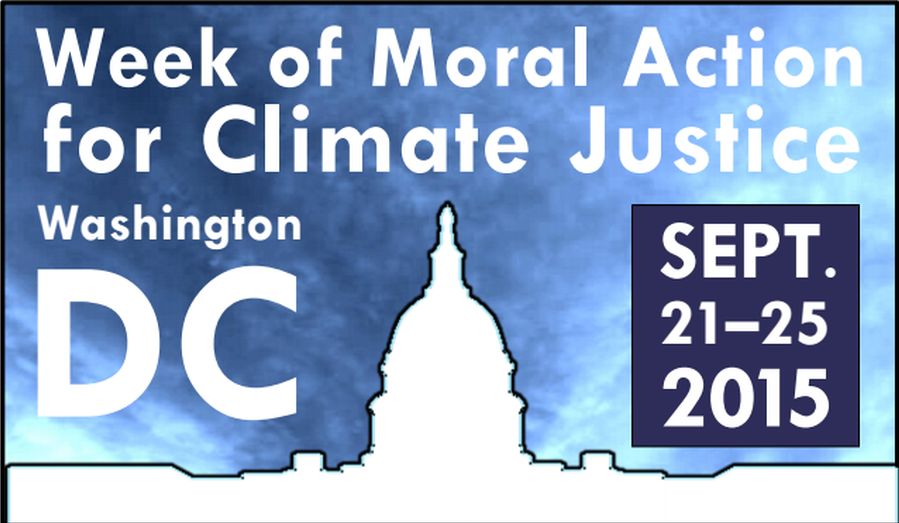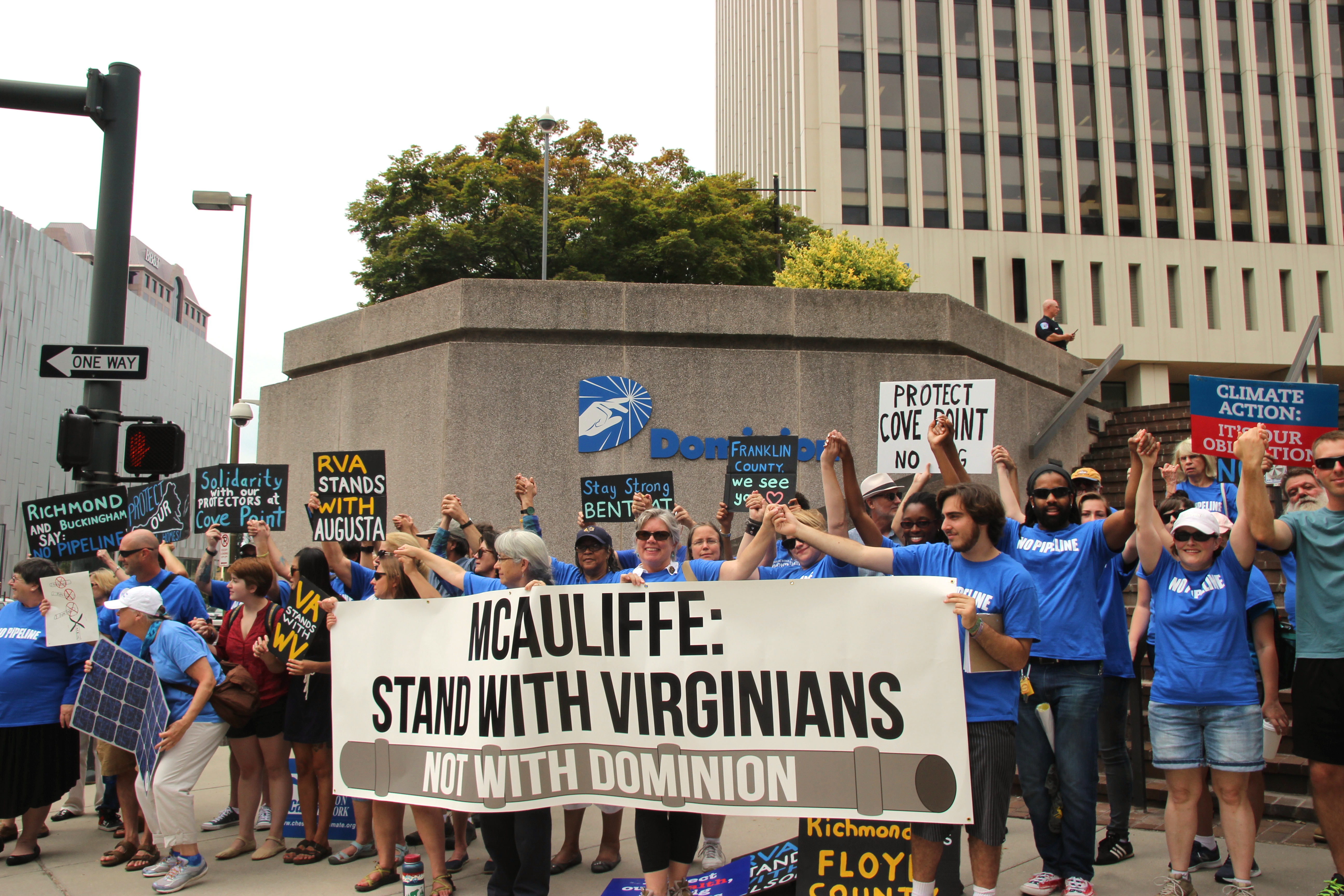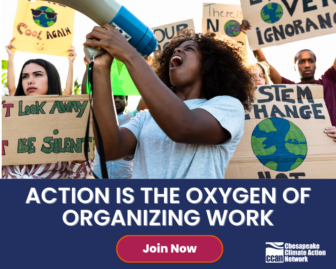This is the week many of us have been waiting for. Pope Francis landed in DC last night with a warm welcome from President Obama. By now, he’s already chipping away at the busy schedule of his multi-city American tour. The few days that the Pope is present in the District marks a historic moment, one that I hope we all remember as groundbreaking for the climate.
These next few days will be hectic to say the least, but they will be bountiful in progress. This morning, in his first address to the American public, Pope Francis applauded President Obama’s efforts to curb emissions. And the Pope’s inclination to pontificate about climate action during his U.S. tour probably won’t stop there.
For the first time in history, a Roman Catholic Pope will be addressing a Joint Session of Congress. What makes this phenomenon more significant is that Pope Francis will speak on the heels of releasing a powerful teaching on climate change that holds no patience for the polarized politics of Congress. It’s a moral call to save our common home.
Pope Francis’ encyclical, Laudato Si’, calls on all men and women of good will to take a stand for the future of the home that we all share, not to mention to take a stand for each other. Climate change is no longer just an environmental issue. It is a moral one. With so much opportunity to transition to clean energy, it is a shame that federal action on climate is largely at a standstill in the U.S. Congress. This is why we must come together to stand with the Pope and #FollowFrancis in his call for widespread, robust climate action across the political realm.
The Pope’s visit to D.C. has spurred action across the city. This week climate, social, faith and environmental activists alike have hosted a number of actions to call upon our leaders to take charge on addressing the injustice of climate change. CCAN’s very own National Campaign Director, Ted Glick, has now been fasting with fellow Beyond Extreme Energy members for 16 days in a call to halt the approval of any new permits for fossil fuel projects by the Federal Energy Regulatory Commission. Tonight the Franciscan Action Network is hosting an Interfaith Overnight Prayer Vigil where faith and civic leaders will offer inspiring messages of hope, justice and peace in light of a changing climate.
Perhaps one of the more crowd-attracting actions will occur tomorrow morning, September 24th, on the National Mall as the Pope addresses Congress. Thousands of people, from near and far, will gather on the Mall early tomorrow morning for the Moral Action for Climate Justice rally to follow Pope Francis’ lead and underscore the moral imperative of the climate crisis. Featuring prominent musical artists and over forty-five speakers, this rally will vocalize the immense support for action before our Congressional leaders as they listen to Pope Francis’ words.
As citizens of the United States, we have the power to exercise our civic duty and call upon our leaders to advance smart climate policies now. Our duty is more than just civic though – it is ultimately moral. The United States has such great untapped power to catalyze the clean energy revolution. Together we must ensure that America accomplishes a large-scale transition from a dirty fossil-fueled economy to one of clean power and minimized externalities. United together, we can step in that direction today.
Take action now by emailing your U.S. Representative and urging him or her to cosponsor the Healthy Climate and Family Security Act. This bill would force polluters to pay for the emissions they spew into our common home, while cycling 100% of the revenue back to American households. CCAN will be out on the National Mall tomorrow morning, rallying up support for this bill which would take on the biggest job on the planet – getting rid of carbon. Email your legislators now and then join us on the National Mall tomorrow morning at 7:30 AM to showcase your support for climate action. A carbon-free future is one that we deserve and we have an immense opportunity to make that future a reality. Let’s act now, together. The future is in our hands.
Meet a Changemaker: Baltimore Community Activist Destiny Watford
As a member of Free Your Voice, Destiny Watford has been a leader in fighting to prevent the nation’s largest waste-to-energy incinerator from being built in her Curtis Bay community in Baltimore.
After four years of organizing and countless actions, the company’s plans are indefinitely stalled. Earlier this year, the students of Free Your Voice successfully pressured both Baltimore City and Baltimore City Public Schools to vote to terminate their energy contract with the company, Energy Answers.
Free Your Voice, along with United Workers, is now pushing the Maryland Department of the Environment to give control over the proposed incinerator site back to the community, so they can pursue sustainable Fair Development alternatives.
Click here to watch the powerful video and sign the petition to the Maryland Department of the Environment!
Your name: Destiny Watford
Your age: 20
Where you live: Baltimore, Maryland, in a small community named Curtis Bay.
Where you go to school / what are you studying? I’m a junior at Towson University. I major in English, with a concentration in writing and Mass Communications, with a focus in P.R. and Advertising.
Why did you decide to get involved in taking action on stopping the incinerator?
I’m a member of Free Your Voice, a student led human rights group based out of my old high schooI, which is located in Curtis Bay. I was born and raised in Curtis Bay and, although we have a long history with air pollution and harmful developments that put our lives at risk, Free Your Voice decided as a group that enough is enough.
Just because Curtis Bay has always been treated as a dumping ground — a story similar to many other communities across the nation — doesn’t mean that the community has to stay voiceless. We can change the fate of our community.
What has inspired you most working in your community of Curtis Bay?
Curtis Bay is a community just like any other. My family, my friends, my teachers and neighbors all live and/or go to work in the community. My life is very much rooted in Curtis Bay. To have an incinerator that would be burning 4,000 tons of trash per day, emitting 240 pounds of mercury and 1,000 pounds of lead into the air every year — less than a mile from where I play with my baby nephew on the playground, where my little brother goes to school, and where so many of my family members work — is a perfect example of failed development. I wanted to have a hand in changing that.
What has impacted you the most in this fight?
The power of art, community, and youth. Art has played a very crucial role in our campaign. Throughout our fight to stop the incinerator we have expressed our concerns through a kaleidoscope of mediums – we wrote speeches, poetry, two of our group members wrote a fantastic rap about our struggle and our fight for clean air. And, without our neighbors and community members working together to change the fate of our community, we wouldn’t have made the progress that we did.
How do you plan to continue fighting the incinerator and fighting for Fair Development in Curtis Bay?
Well, our fight against the incinerator is still going strong. We have experienced major victories in our struggle. Due to pressure from the group, it was revealed that Energy Answers, the company building incinerator, had violated the Clean Air Act.
We’re making a transition in our campaign. Although we will still continue to fight the incinerator, we’re now exploring positive alternatives to the proposal. The incinerator site is 80 acres. We’re calling for community control of the land to develop truly green alternatives. Thus, breaking the cycle of failed development.
So, now we’re calling upon the Maryland Department of the Environment (MDE) to enforce the law and hold Energy Answers accountable so that we can move forward towards Fair Development.
To do this, the group created a video made up of friends, allies, and community members that have been involved in stopping and/or concerned with the incinerator project. (Sign our petition to MDE here.)
What do you like to do when you’re not advocating in your community?
When I’m not racing to finish a 10-page essay, scrambling to identify the square root of ‘x’, or trying to memorize need-to-know terms for finals, I could be found playing board games with my family and/or friends, binge-watching the latest netflix-craze, or reading.
Activist Speak Out On Maryland's Climate Action Plan
In the past eight weeks, over 200 Marylanders attended and testified before the Maryland Climate Commission. The Maryland Climate Commission held listening sessions across the state to report on the progress of Maryland’s Climate Action Plan and also to learn how people across the state want to address climate change in their communities.
Maryland’s Climate Action Plan was borne out of the 2009 passage of the Greenhouse Gas Reduction Act (GGRA), which created over 150 programs and policies designed to cut our state’s greenhouse gas emissions by 25% by 2020. This GGRA law must be renewed in 2016. Without action from the Maryland General Assembly, the state will lose its legal mandate to cut greenhouse emissions and implement the programs that will protect Maryland for generations to come. CCAN is mobilizing activists to call on our state legislators to renew and strengthen the GGRA. One of the most critical ways we can strengthen our plan to reduce greenhouse gas emissions — and the top recommendation in Maryland’s Climate Action Plan — is to increase the state’s clean energy standard to 25% by 2020.
The climate commission could have walked away empty handed, without any input from everyday citizens – yet you made sure that didn’t happen. Across the state, climate activist, labor, faith and elected leaders spoke out with one clear message: Maryland must do more and can do more to address climate change in our state. This was a critical step in ensuring that Maryland’s Climate Action Plan is renewed. The Climate Commission, along with the Maryland Department of Energy, will be issuing a report to the Hogan administration and our state legislators this fall to help shape Maryland’s next steps.
The first meeting was held in Baltimore City in a small library meeting room. City Councilman Jim Kraft decried Governor Larry Hogan’s nixing of the funding for the red line and the lack of opportunities for economically down-trodden Baltimore to be a transit-oriented community. He was joined by Cheryl Arney, who held up a picture of her granddaughter along with a report predicting the rising sea levels along Maryland’s coast line and talked about the price of inaction. Representatives from Fuel Fund spoke out about how weatherization and improving the energy efficiency of low and moderate income households would have a lasting impact on our climate. Funds for these weatherization projects are possible due to programs outlined in the Greenhouse Gas Reduction Act and Maryland’s Climate Action Plan.
On the Eastern Shore, a small group of dedicated activists championed strengthening Maryland’s Greenhouse Gas Reduction Act and increasing Maryland’s clean energy standard.
In Western Maryland, Engage Mountain Maryland, local elected officials and Senator Roger Manno showed up to have their voices heard. Members of Engage Mountain Maryland spoke of their opposition to fracking and declared that it should not be a component in any climate action plan due to the unknown health and environmental risks. They also shared studies that show the emissions from fracked gas worsens climate change and is far worse than coal for the climate. Senator Manno decried Governor Larry Hogan’s refusal to publish the new rules on coal fired power plants. Local residents spoke of their love for the landscape of Western Maryland and how they feared that fracking would poison their communities.
In Southern Maryland, Cove Point activists spoke stridently against the export facility in Lusby and the impacts that it would have on their health. One activists spoke out and stated that if everyday citizens had to curb their pollution through vehicle emissions and other legal mandates, than coal power plants need to have mandates to curb their own pollution.
The climate commission listening sessions culminated in Prince George’s County. Delegate Dereck Davis pledged to rise above partisan politics and work to have the Greenhouse Gas Reduction Act passed through the House of Delegates. Delegate Joseline Pena-Melnyk, challenged everyone in the room to call, show up to hearings and ensure that their legislators felt grassroots pressure to pass the renewal of the GGRA and fight for clean energy policies. Over 96 people attended the Prince George’s County climate commission listening session, leaving an undeniable impression on the climate commission that citizens from across the state want to see Maryland be a leader in confronting the climate crisis.
To add to the flood of voices demanding that the Maryland Climate Commission work to strengthen and renew Maryland’s Climate Action Plan — submit your comment today!
Two Years to Victory: MD Gears Up to Win Permanent Protections Against Fracking
“I thought you all would be taking long vacations this summer!” exclaimed a CCAN supporter, when I called to invite her to an organizing meeting happening this July in her community regarding the future of fracking in Maryland.
She was referring to the big news coming from Annapolis this April, when concerned citizens across the state pushed elected officials to pass the first legislative moratorium on hydraulic fracturing in the country. But this significant win will only last for two years, which means every Marylander — parents, students, business owners, concerned citizens — has two years to organize and secure permanent, statewide protections against fracking.
The passage of a legislative moratorium was a huge testament to the power of public participation in government. As WBAL reported on the Friday that the bill first passed the Maryland Senate, “opponents of fracking seem to have out-demonstrated, out-lobbied and outdone those who support the controversial process.” Indeed, the “Don’t Frack Maryland” coalition, comprised of over 200 groups across the state, turned out more calls and emails than legislative offices had ever seen on the fracking issue. And nearly 400 constituents came to Annapolis over the course of 3 months for lobby meetings, rallies, press conferences, and to deliver information to legislators.
While the moratorium guarantees that no fracking permits can be issued in Maryland for two years, it was drastically altered from the bill our advocates wrote. A provision establishing a new panel to review health and economic studies was cut. The final version also requires the Maryland Department of the Environment to adopt regulations for hydraulic fracturing by October 2016, which would then be effective as soon as the moratorium expires in October 2017. Simply stated: the next two years is not a time to wait and see what happens. It is a hard deadline on a frack-free Maryland. By the end of 2017, our state could open for business in the eyes of the gas industry.
That’s why CCAN is building a groundswell of support across the state, engaging Maryland residents in campaigns to enact permanent measures to ban fracking in their own communities.
In Prince George’s County, CCAN and our allies are working with Councilwoman Mary Lehman to introduce a county ordinance to ban fracking. Southern Prince George’s County sits on top of the Taylorsville gas basin. A Texas-based company has already leased land for fracking just across the Potomac River in the Virginia portion of this same basin, making Prince George’s one of the most vulnerable counties outside of Western Maryland to potential gas extraction. More than 70 county residents packed the Greenbelt Public Library last Tuesday night to learn about the threat fracking poses to Prince George’s County. Hundreds have already signed a petition to the council, and CCAN volunteers are hitting the streets to secure support from small businesses and other community leaders. Meanwhile, in Baltimore City, Councilman James Kraft has introduced a resolution endorsing a statewide ban.
This is our game plan: Where there’s gas, we’ll pass local laws to keep it in the ground. Where there isn’t gas, we’ll pass resolutions telling our state legislators they need to prohibit drilling statewide and KEEP IT IN THE GROUND, all building momentum toward passing a permanent statewide ban.
We know that fracking poses dangerous threats to public health, with more damning scientific evidence coming out every passing month. Fracking causes real estate values to plummet and puts an enormous strain on rural infrastructure like roads and bridges. Idyllic, pastoral communities all over the United States have been scarred and abandoned in fracking’s wake. The drilling process takes hundreds of millions of gallons of fresh water and leaves behind irrevocably polluted land, air, and waterways. There is no proven way to regulate this process to protect humans and the environment from these harms.
We also know that the gas industry has shown time and again that it does not care about the havoc it wreaks.
We have a powerful movement putting wind in the sails for a permanently frack-free Maryland. But we’re going to need to keep educating, inspiring, and bringing new voices and communities into this movement to ultimately win.
Want to get the latest updates, and learn how you can get involved this fall? Join us on September 9th at 7:00pm for the Maryland activist conference call. CCAN organizers and volunteers across the state will come together to discuss our big campaign plans this fall — including building the movement for clean energy alternatives to fracking — and how you can get involved!
Help Elevate the Pope's Call on Climate this September in DC
Pope Francis is coming to Washington, D.C., arriving September 22nd and taking part in activities through the 24th. He will be in the United States until the 27th.
A growing coalition of faith-based, environmental, climate, social justice and other groups has come together and is planning a variety of activities leading up to and during the week that this inspiring and courageous world leader will be in town. This pope has been outspoken about the urgency of the climate crisis and its connection to the larger environmental, social and economic crises of our time. It is important that we who share his concerns take visible action to support him and amplify his message.
Beyond Extreme Energy begins the activities with a planned 18-day, water-only “Fast for No New Permits” in front of FERC, the Federal Energy Regulatory Commission. It will begin on Tuesday September 8th and continue until Friday the 25th, which is the day after the Pope’s speech to Congress. CCAN National Campaign Coordinator Ted Glick will be one of those taking part in this action. On September 9th and 10th BXE fasters will be taking part in activities with Grandparents Climate Action.
CCAN and BXE are working with the Franciscan Action Network, which is planning a fast September 14-23 at McPherson Square. The fast is part of an international fast organized by the Global Catholic Climate Movement. Their fast will end the evening of September 23rd with an interfaith service at the Lincoln Memorial.
On the evening of September 22nd Jewish Rabbis will lead an evening Yom Kippur Day of Atonement/At-Onement service at the Lincoln Memorial.
The big day is September 24th. That morning Pope Francis will speak before Congress. Outside on the mall Moral Action for Climate Justice is organizing a rally with a broadcast of the Pope’s speech, and a program of music and speakers before and after. The National Park Service and other police agencies expect hundreds of thousands of people to be present on the mall that morning.
And on September 25th, as the Pope speaks in NYC before the United Nations, people will flood Capitol Hill to call upon Senators and House members to finally get serious and move forward to take action on climate. Later in the day, Beyond Extreme Energy is organizing a gathering at FERC as the fasters end their fast and as religious leaders attempt to take copies of Pope Francis’ “Laudato Si’: On Care for Our Common Home” into FERC to deliver to the five FERC Commissioners.
CCAN looks forward to all of these activities next month and urges our members and supporters to take part in as many of them as you can. It’s time for moral action for climate justice!
Hands Across Our Land Takes Richmond. Calls on Governor McAuliffe to Do His Job
This post was authored by CCAN’s new volunteer Richmond Pipeline Coordinator, Chelsea Norman.
“Stand With Virginians, not with Dominion” — that’s what echoed through the streets of downtown Richmond on Tuesday as CCAN and our allies participated in the first Hands Across Our Land pipeline resistance march.
This August marks one year since the first informational meetings Dominion Power held in Augusta, Buckingham, and Nelson counties for their proposed Atlantic Coast Pipeline. It also marks one year of growing pipeline resistance across Virginia.
I started as a volunteer with CCAN a week ago, and the dedication to protecting Virginia’s climate from shortsighted fossil fuel projects like these is abundantly clear. Made up of landowners and their allies, business owners, faith leaders, students, lifelong climate activists, artists, and concerned citizens, a community has been born that is resisting new natural gas infrastructure right in the heart of Dominion-ruled Virginia.
Three proposed pipelines: Atlantic Coast Pipeline, Mountain Valley Pipeline, and the lesser known Atlantic Connector — together these spell disaster for our lands, our coast, and our climate. That’s why over fifty people came out to join hands Tuesday and urge Governor McAuliffe to withdraw his support of these disastrous pipelines.
Two of the inspiring people that came out Tuesday were Will Barr and his mother-in-law Lisa Tulley, who are currently being sued by Dominion for denying the company approval to survey their land. Surveying seems like such a small act, but in reality it consists of a myriad of inspectors, large crews on the property and digging for about a week’s time.
“For me, in addition to the environmental effects, it’s about property law. It destroys the community, it’s dangerous and I can’t control what’s happening to my own property — something I’m supposed to be able to protect.” Barr and his wife own eight mountainside acres in Nelson County’s Horizon EcoVillage. The Atlantic Coast Pipeline will cut across their property, along with eleven other lots in the village and 40 acres of public land. According to Barr, spreading across these lots is a wetland that hosts a rare tree breed as well as an endangered species that Dominion’s environmental representatives plan on trapping,. Barr’s mother-in-law is particularly concerned about water: “It’s going to intersect five aquifers that serve our well system. My biggest concern is the quality of our drinking water. What happens if there’s a leak?”
Today’s event was one of 15 Hands Across Our Land events across Virginia – including one in nearly every county threatened by these proposed projects, and one of 30 nationwide. This coordinated day of action was conceived by organizers at the Blue Ridge Environmental Defense League and supported by dozens of Virginia groups. The Richmond event was coordinated by BREDL, CCAN, Virginia Sierra Club and the Virginia Student Environmental Coalition (in their first major action of the new school year).
https://twitter.com/BelEsprit92/status/633681476651982848/video/1
As a unified community we stood, hands clasped, banners waving, and urged Governor McAuliffe to withdraw his support of the Atlantic Coast Pipeline and Mountain Valley Pipeline. He has said before that there is nothing he can do about these pipelines, but that is far from true. He can stand with Virginians, not with Dominion and their allies. He can stand with the property owners whose land will be destroyed and whose property values will plummet, and the low-income communities whose health will be impacted by compressor stations and other dirty infrastructure projects
 James Freeman, a Richmond resident and Virginia mountain hiker was in the crowd today. In one hand he held a “Protect Our Virginia” sign and in the other he held the clearest symbol for Hands Across Our Lands – his eight-year-old son Dylan’s hand. “We must think of our future generations who will reap the repercussions of our decisions.”
James Freeman, a Richmond resident and Virginia mountain hiker was in the crowd today. In one hand he held a “Protect Our Virginia” sign and in the other he held the clearest symbol for Hands Across Our Lands – his eight-year-old son Dylan’s hand. “We must think of our future generations who will reap the repercussions of our decisions.”
What’s next? In September, we expect Dominion to file for the Certificate of Public Necessity and Convenience, i.e. their permit to start construction of the Atlantic Coast Pipeline. Virginians from Highland to Chesapeake are gearing up to respond, and so are we here at CCAN. Stay tuned for more.
Hampton Roads speak up! Share your climate change story with Flood of Voices
Today we, along with our partners at Virginia Organizing and Virginia Sierra Club, are inviting you to check out and join the “Flood of Voices,” a new website dedicated to the stories of coastal Virginians being impacted by rising tides and flooding, especially those whose voices are not normally heard.
See the stories your neighbors have contributed so far here.
Then, join the Flood of Voices by sharing your own! Click here to get started.
The Flood of Voices project began in March, when Virginia Organizing brought the South Hampton Roads community together for a series of events to share and collect stories of flooding in low-income neighborhoods.
Everyone has a story, from Tuere Brown (above) who was stranded on a washed out road trying to take students home from a flooded school, to Peggy Stamoulis, who put herself in the path of flood waters because she needed a job. These voices are important, and tell the story of daily life in Hampton Roads.
We know personal stories are the most effective way to inspire action and build a strong movement against climate change. CCAN, Virginia Organizing and Virginia Sierra Club are using these stories to educate and organize across Virginia and build the support we need to win solutions for our families — like passing the Virginia Coastal Protection Act. The stories of our neighbors in Hampton Roads play a huge role in influencing our legislators and show that climate change isn’t a crisis for our grandchildren, it’s a crisis for us right now.
On August 3, the Environmental Protection Agency released the final version of its Clean Power Plan. The Plan will reduce carbon emissions that are fueling climate change and sea level rise while increasing development of wind, solar and efficiency.
The EPA rules leave it up to Virginia to decide how to cut fossil fuel pollution. Over the past year, CCAN activists like you have been building momentum behind a win-win solution: Passing the Virginia Coastal Protection Act to join the nine-state Regional Greenhouse Gas Initiative, or RGGI. This bipartisan state legislation would cap carbon pollution in Virginia and raise up to $100 million annually to fund flooding protection measures in our hardest-hit neighborhoods.
In the U.S., the Hampton Roads region is second only to New Orleans as home to the most people at greatest risk from flooding caused by rising sea levels. Residents are already seeing the consequences – living on the front lines of climate impacts driven by fossil fuel industry pollution. Chronic flooding is forcing the raising of homes, roadways and naval infrastructure, and it’s only getting worse. Scientists predict that sea levels could rise by as much as seven feet within this century. In the event of a major storm, there is no effective plan to evacuate and shelter residents, even as warming ocean temperatures and longer hurricane seasons increase the risk of superstorms like Sandy.
We must act now to protect coastal Virginia from the impacts of climate change, and a “flood of voices” is rising up to demand change.
Everyone has a story to tell: how has flooding impacted your life? We want to know! Share your story with us by filling out this form and we’ll follow up with you.
From CCAN’s General Counsel: Update on Cove Point Legal Fight
While groups on the ground in Calvert County continue to stand up to Dominion’s massive liquefied natural gas (LNG) export terminal along the Chesapeake Bay, the fight is simultaneously moving forward in federal court.
On behalf of CCAN, Patuxent Riverkeeper, and Sierra Club, and their members who will be harmed by Dominion’s project, Earthjustice asked the United States Court of Appeals for the District of Columbia Circuit on May 7th, 2015 to review the Federal Energy Regulatory Commission’s (FERC) decision to approve Dominion’s LNG export project without a valid environmental review. Our lawsuit centers on FERC’s unlawfully narrow environmental review of Dominion’s massive project to convert its virtually idle LNG import facility into a hub for LNG exports. That review—criticized in over 150,000 citizen comments—omitted credible analysis of the project’s lifecycle global warming pollution, along with all the pollution associated with driving demand for upstream fracking and fracked gas infrastructure; its impact on water quality in the Chesapeake Bay and risk to the critically endangered North Atlantic Right Whale; and potentially catastrophic explosion and fire threat to hundreds of nearby residents.
Our legal fight to stop the $3.8 billion export facility began within FERC itself. CCAN members joined thousands of others in submitting comments to FERC on Dominion’s application and the agency’s environmental review of the project. After conducting the minimum review allowed under the National Environmental Policy Act (NEPA), FERC approved the proposal on September 29th, 2014. Concerned that the agency had not fully considered the many ways that Dominion’s LNG export project will impact the environment and threaten community health and safety, CCAN and its partners, with the help of Earthjustice, asked FERC to review its decision. FERC sat on our request for months—a process known as “tolling”—even as it approved order after order allowing Dominion to begin construction. After seven months, FERC finally denied our request. Once we completed FERC’s internal review process (or “exhausted our administrative remedies,” in legal jargon), we were finally able to challenge the agency’s decision in federal court.
Tragically, FERC’s foot-dragging allowed Dominion’s bulldozers to start construction before residents were able to appeal to the federal court. Citing the fact that Dominion’s construction activities have already begun to irrevocably damage the landscape and quality of life in Calvert County, Maryland, CCAN, Patuxent Riverkeeper, and Sierra Club asked the D.C. Circuit in June to halt all construction while our case was pending. Injunctions are difficult to obtain, and the court ultimately denied our request, but that decision has no bearing on the merits of our case.
Environmental groups are not the only ones who are challenging FERC’s decisions regarding Cove Point. Before Dominion proposed to expand and convert the terminal, Cove Point was a mostly dormant import facility. Energy companies, including BP, Statoil, and Shell had contracts to import natural gas to the terminal. Dominion granted Statoil the opportunity to relinquish its import capacity, but did not grant BP or any other importer the same opportunity. Signaling that the import market is uncertain, BP has asked the DC Circuit to review this denial, and BP’s case has been consolidated with ours.
We do not yet have a briefing schedule for the consolidated cases, but hope it will allow for argument in the court’s spring term. FERC has failed its important duty under NEPA to analyze and disclose the environmental consequences of allowing Dominion to build and run a facility that can export up to nearly 1 billion cubic feet of natural gas per day. FERC must stop cutting corners when it comes to our fragile climate and environment. Our lawsuit is a step towards pushing FERC in the right direction.
Residents of Buckingham Say NO to Proposed Compressor Station
This is a guest post from Virginia Atlantic Coast Pipeline Fellow, Nqobile Mthethwa, you can reach her at NqobileM@chesapeakeclimate.org.
Over 50 people gathered at the Frances Redwood Center on July 22nd to discuss the proposed Atlantic Coast Pipeline and Compressor Station in Buckingham County. The seminar was a joint effort by Friends of Buckingham, Chesapeake Climate Action Network and Yogaville Environmental Solutions. This seminar was presented to the annual session of the United Baptist Association of Central Virginia.
The presentation gave an overview of the proposed 550 mile and 42 inch Atlantic Coast pipeline and the rush for natural gas in the eastern region of the United States. Friends of Buckingham member Kenda Hanuman presented the dangers of compressor stations and what the proposed Buckingham station would mean for the community. Concerns ranging from toxic emissions, land rights, noise and light disturbances, and the creation of only 2 full time jobs from the station were all discussed.
Following the presentation, community members engaged by firing off questions about the proposed pipeline and compressor station. People were concerned how noise levels that accompany this type of infrastructure would affect sleep in this rural community. Many had pointed questions about the elderly people of Buckingham with compromised health issues including respiratory conditions. The elderly fear their lack of mobility could be detrimental in the event of leaks and explosions.

Many people had questions about the economics, specifically the outsourcing of jobs to out of state workers, the loss of land and depreciation of its value, and supposed tax benefits gained by the people of Buckingham being outweighed by health/environmental costs. Especially concerning was the difficulty of tapping into the gas to be used by Buckingham. Right now, if a county or business wanted to use gas from the pipeline, it would cost $5 – 8 million to ‘tap’ the line.
Citizens are troubled with the way Dominion is forcing their way onto private property by lawsuits against innocent citizens. Many people’s families have lived in Buckingham for hundreds of years. Dominion is willing to compromise the health and livelihood of Buckingham citizens for empty promises of cheap natural gas and economic benefits.
The general consensus among attendees was there is no benefit to Buckingham citizens or anyone else in the pipeline path, there are only costs to health, community and the environment. Further, they saw that natural gas isn’t a sustainable source of energy because the effects of climate change are predicted to get worse with the continued use of fossil fuels.
The more people learn about this project, the more people turn against the ACP. We see citizens of all faiths and regions in Virginia are standing together in opposition to the Atlantic Coast Pipeline and compressor station. Like the folks in Buckingham, people across Virginia have been and will continue to build coalitions to resist every point of the destructive proposed pipeline and compressor station. The Buckingham meeting has reaffirmed the belief that “Organized people will always win over organized money.”
Huge victory to keep ‘EmPOWERing’ Maryland
Last Thursday, the Maryland Public Service Commission (PSC) launched Maryland into the top tier of electricity-saving states by embracing one of the highest energy efficiency targets in the country. The order requires that Maryland’s electric utilities achieve annual incremental electricity savings of 2.0% of retail sales per year in perpetuity. The long-awaited decision, which CCAN’s policy experts pushed to make as strong as possible, gives a huge boost to the state’s “EmPOWER Maryland” program, which helps consumers save money while fighting climate change.
This is a big step forward with exciting promise — the new EmPOWER rules will require utilities to save over 1.2 million megawatt-hours per year. That’s the energy equivalent of closing a 460 megawatt coal-fired plant every two years, and will reduce carbon at levels equivalent to taking 173,000 cars off the road annually. To put that another way, the new EmPOWER rules will reduce carbon emissions at the same rate as building 470 megawatts of new wind power every year. That’s nearly three times greater than Maryland’s installed wind capacity today.
To put Maryland’s new goals into a national perspective, only two other states—Rhode Island and Massachusetts—achieved saving levels higher than 2% last year. In terms of future targets, Maryland’s new goals are among the top five in the country.
CCAN’s director, Mike Tidwell, was out in front of news coverage on the PSC decision, driving home its impact on WAMU and in the Baltimore Sun.
“The state of Maryland has just taken a huge step in showing that action on air pollution and climate change can go hand in hand with consumer savings,” said Tidwell, “The PSC deserves praise for hearing the public’s voice that efficiency is a win-win. We now hope other states will follow suit at this same high level.”
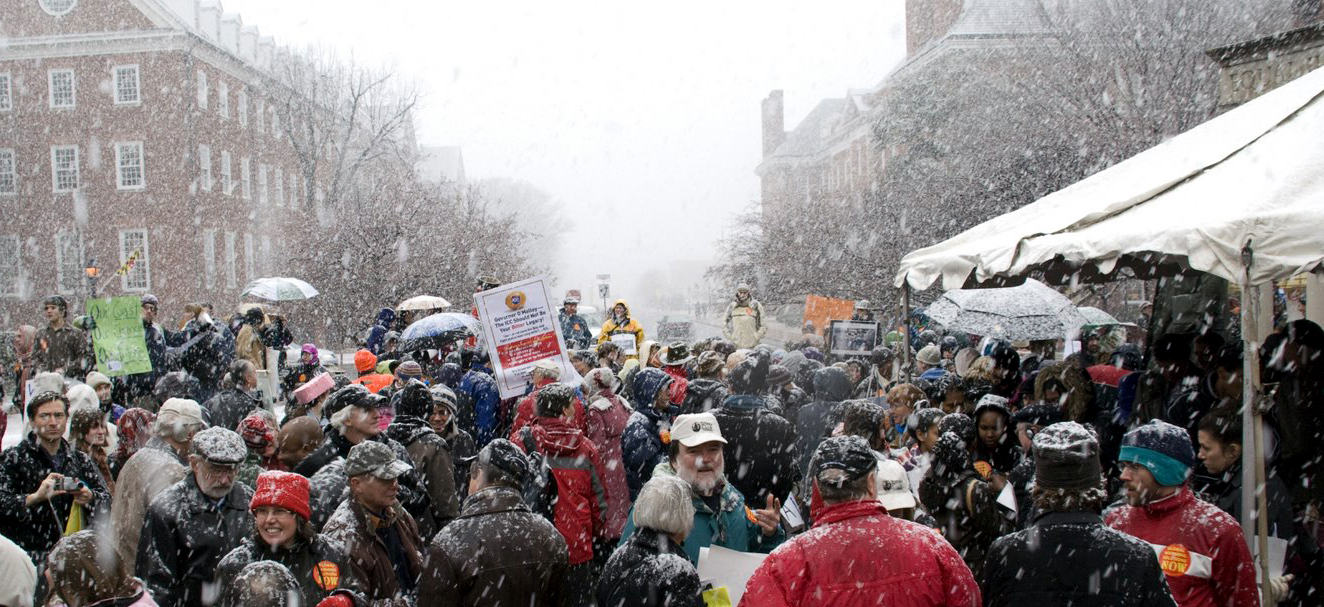
In 2008, CCAN activists helped drive the campaign to pass the EmPOWER Maryland Energy Efficiency Act. That law, which set the goal of reducing energy use by 15% below 2007 levels by 2015, enabled consumer rebates and other incentives to invest in energy-saving measures. The PSC’s decision to expand and strengthen the EmPOWER program will ensure we continue making progress beyond 2015. This decision was three years in the making, and CCAN was an official intervenor in the PSC process, pushing for the strongest programs and goals every step of the way.
Looking ahead, the new EmPOWER rule will play a key role in meeting Maryland’s commitment to reduce global warming pollution by 25% by 2020 under the Greenhouse Gas Reduction Act. The state’s new efficiency commitment will help achieve Maryland’s Climate Action Plan. CCAN will be focused in the coming year on making sure we renew and strengthen other core elements of that plan — like continuing to increase our reliance on clean electricity sources like wind and solar.

